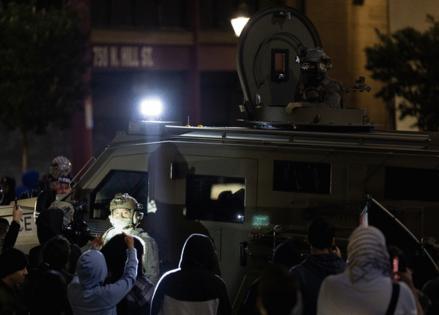Trump immigration crackdown sparks fresh unlawful-conduct claims
Published in News & Features
President Donald Trump’s escalating immigration crackdown has sparked a new round of lawsuits alleging illegal seizures by masked federal agents, as well as violations of U.S. privacy rights and environmental laws.
The Trump administration in the past month has ramped up raids on homes, workplaces and even courthouses as U.S. officials strive to reach a new target of 3,000 arrests a day. That’s led to complaints over how authorities are identifying people suspected of being in the U.S. unlawfully, the methods they’re using to take them into custody and where they’re holding them pending deportation.
More than 150 lawsuits have been filed across the U.S. challenging Trump’s hard-line immigration policies since he began his second term in January, according to Bloomberg’s analysis.
The president has created “an illegal detention and deportation dragnet that shows no signs of ceasing,” immigrant advocates in Los Angeles argued in a July 2 class-action lawsuit over the raids across Southern California.
The suit claims heavily-armed agents are using “grossly disproportionate” displays of force and warrantless arrests, while engaging in illegal racial profiling to target non-White people — including U.S. citizens. An emergency request is pending to halt arrests based on a person’s skin color. Separately, the group alleges detained people are being denied access to lawyers, and a judge is set to hear arguments on that issue this week.
In another case, a U.S. citizen arrested in June outside a Home Depot in Los Angeles is seeking $1 million in damages. According to an administrative claim letter sent July 1 to the Department of Homeland Security — a required step before filing a lawsuit — Job Garcia was taken into custody while recording immigration agents making arrests in the parking lot and was held for 25 hours before he was released without charges.
The president’s stepped-up enforcement — including the new arrest quota at Homeland Security — “is what results in indiscriminate arrests, often violent, often injuring people who are targeted,” said Thomas Saenz, president and general counsel of the Mexican American Legal Defense and Educational Fund, which represents Garcia.
But Trump officials, who are fighting all the suits challenging the immigration crackdown, say government actions have been lawful.
Homeland Security’s “enforcement operations are highly targeted, and officers do their due diligence,” spokesperson Tricia McLaughlin said. She called claims of racial profiling by agents “disgusting and categorically FALSE.”
McLaughlin also disputed claims by Garcia about his arrest outside Home Depot. She alleged Garcia had assaulted and verbally harassed a Border Patrol agent. Saenz, the MALDEF president, said Garcia didn’t assault anyone and had engaged in “protected free speech.”
Cracking down on the flow of migrants and expelling foreigners was a centerpiece of Trump’s reelection campaign. Immigration arrests and detentions jumped in the five months since he took office. Immigration and Customs Enforcement was holding more than 50,000 people at the start of June, a milestone it hadn’t achieved since 2019, during Trump’s first term, according to government data analyzed by the Transactional Records Access Clearinghouse at Syracuse University.
Lawsuits against the administration typically come in waves following the announcement or execution of new policies. On immigration, the first cluster of cases challenged executive orders that Trump signed early on to restrict automatic birthright citizenship and repel asylum seekers and refugees. Next came challenges to the rapid removal of several hundred alleged Venezuelan gang members under a rarely-used wartime powers law and the cancellation of foreign students’ legal status to study and work. All of those legal fights are pending.
The administration has intensified efforts to remove people in the country illegally this summer as crossings along the Southwest border have dropped. In May, senior officials set the new target for 3,000 arrests a day, requiring a major acceleration of the administration’s pace of enforcement.
A lawsuit filed in late June seeks to halt construction of an immigration detention facility in the Florida Everglades — dubbed “Alligator Alcatraz” by state officials — that could hold as many as 5,000 people. Advocacy groups claim the Trump administration failed to do environmental impact reviews of the site as required by U.S. law.
The Justice Department contends the suit is aimed at the wrong party, because the facility is being built by the state based on emergency authority from Governor Ron DeSantis, who wants to relieve jail overcrowding caused by ramped-up immigration enforcement. In court filings, U.S. lawyers quoted state officials saying the facility wouldn’t have an effect on the environment because the land was already in use. The state attorney general said the facility began accepting detainees July 3.
A Florida federal judge hasn’t set a hearing date on the challengers’ request for an immediate order halting construction in the “fragile area.”
Another part of Trump’s enforcement plan was targeted last week by a coalition of Democratic state attorneys general. They sued to stop the U.S. Department of Health and Human Services from sharing information with immigration authorities about beneficiaries of Medicaid, a federal program that helps lower-income households pay for medical care. The states also asked a judge to bar Homeland Security from using the data it already received in June and to destroy those records or return them.
The Democratic officials argue Congress approved extending emergency Medicaid coverage to noncitizens and that states would have to cover the costs if eligible families rebuffed the program out of fear it would lead to their deportation. They protested being used “in service of an anti-immigrant crusade.” The states haven’t asked for immediate action by the judge and no hearing is scheduled.
McLaughlin, the Homeland Security spokesperson, defended information-sharing as necessary to make sure ineligible migrants aren’t receiving benefits.
_____
©2025 Bloomberg L.P. Visit bloomberg.com. Distributed by Tribune Content Agency, LLC.







Comments